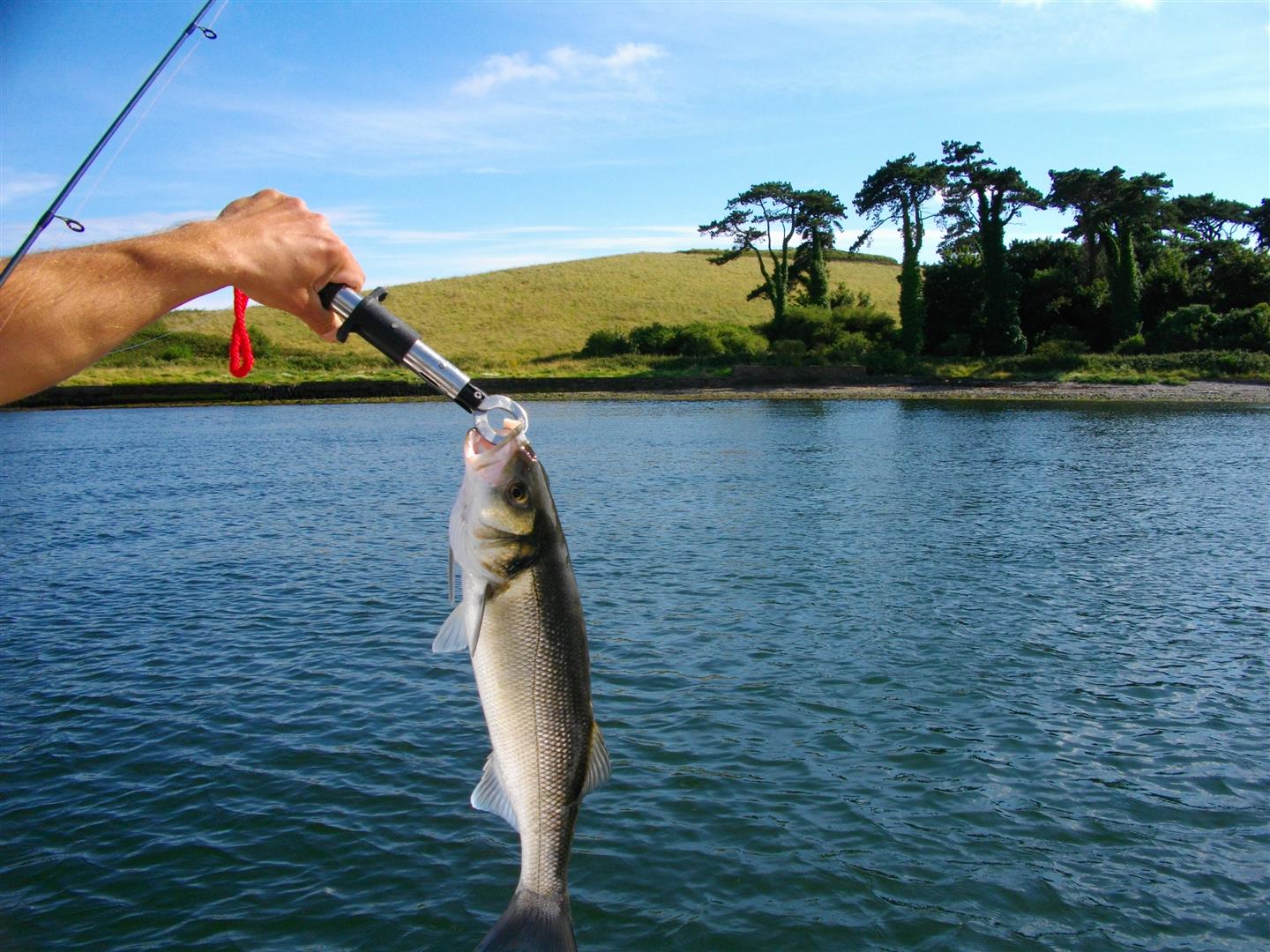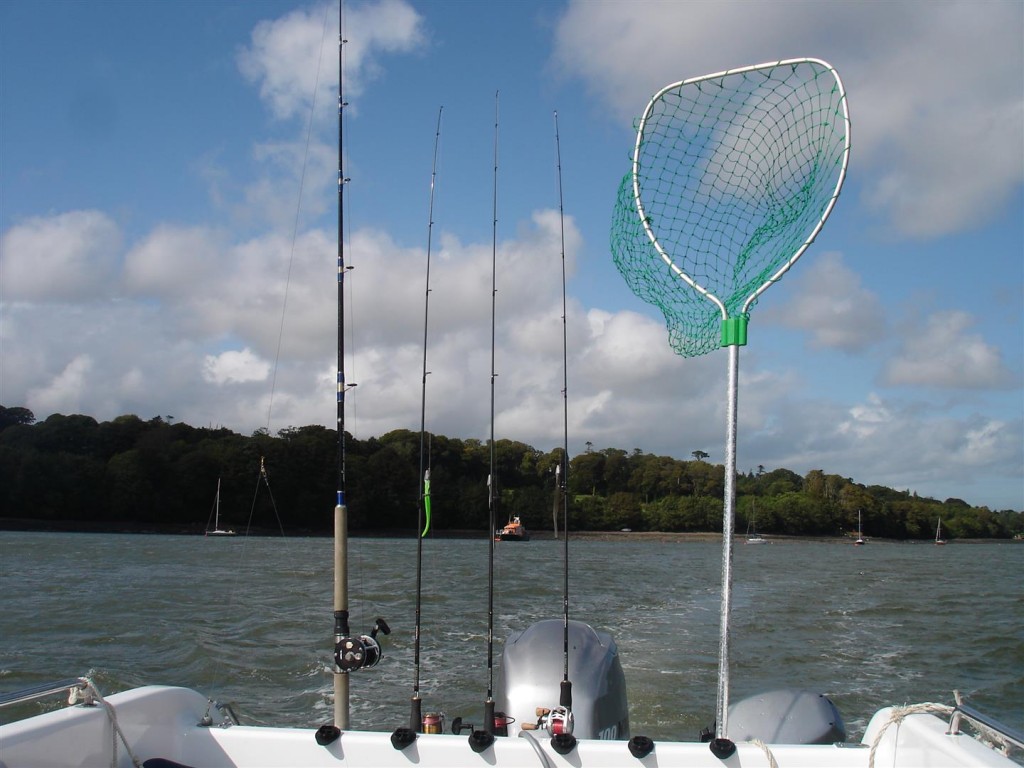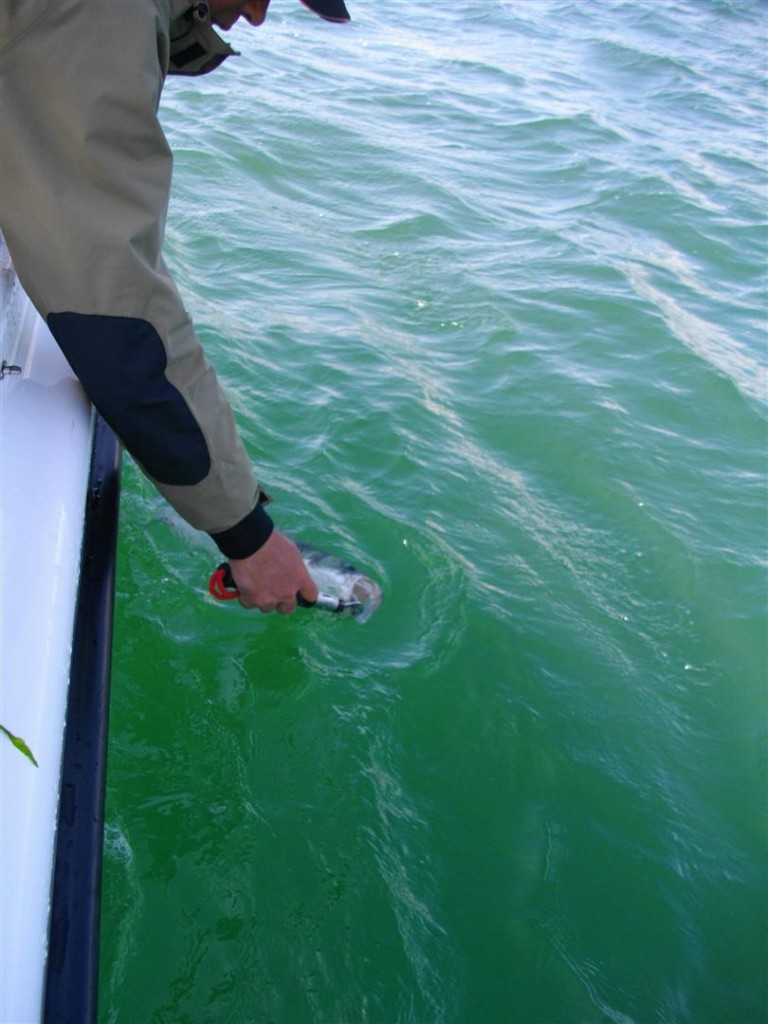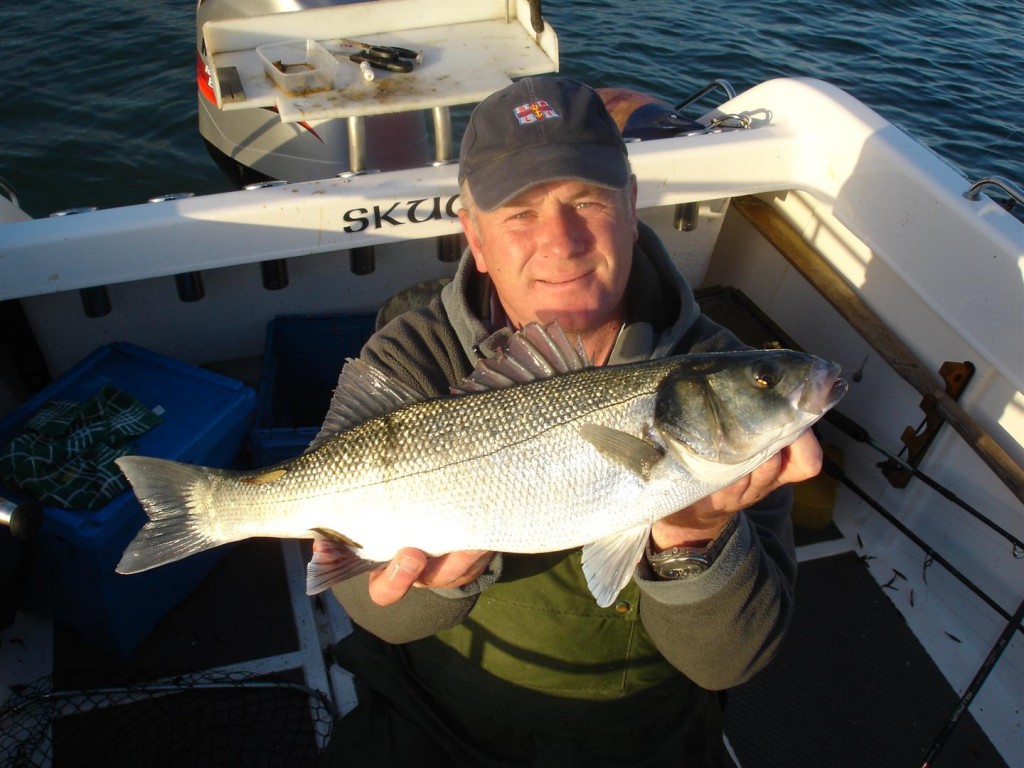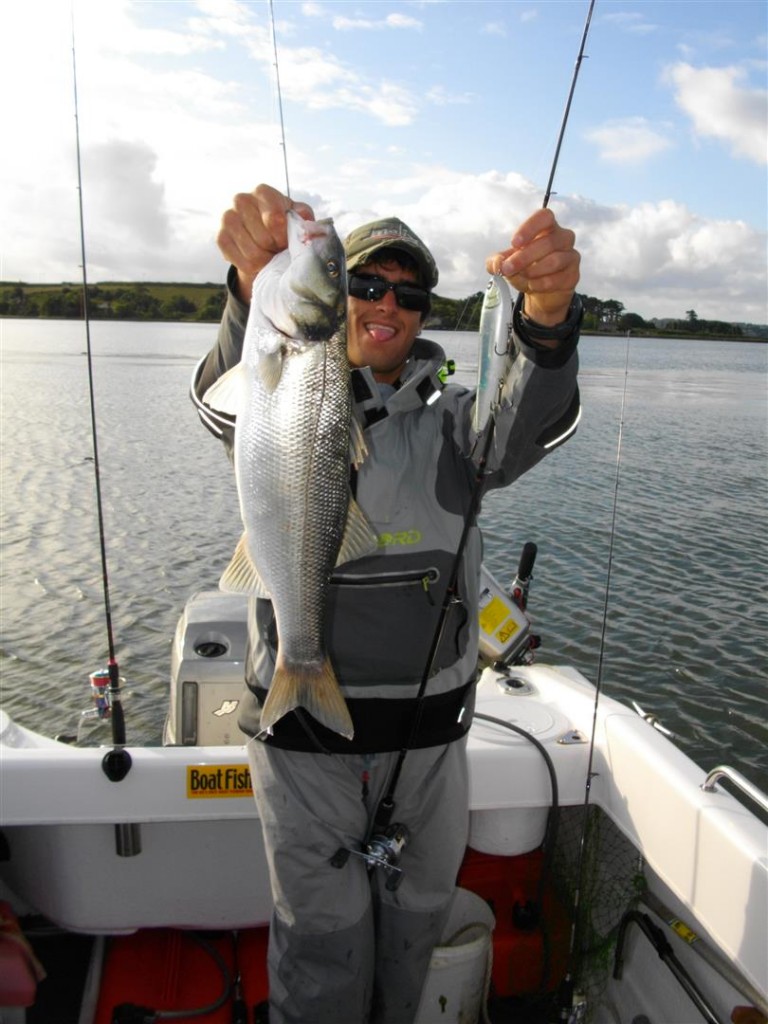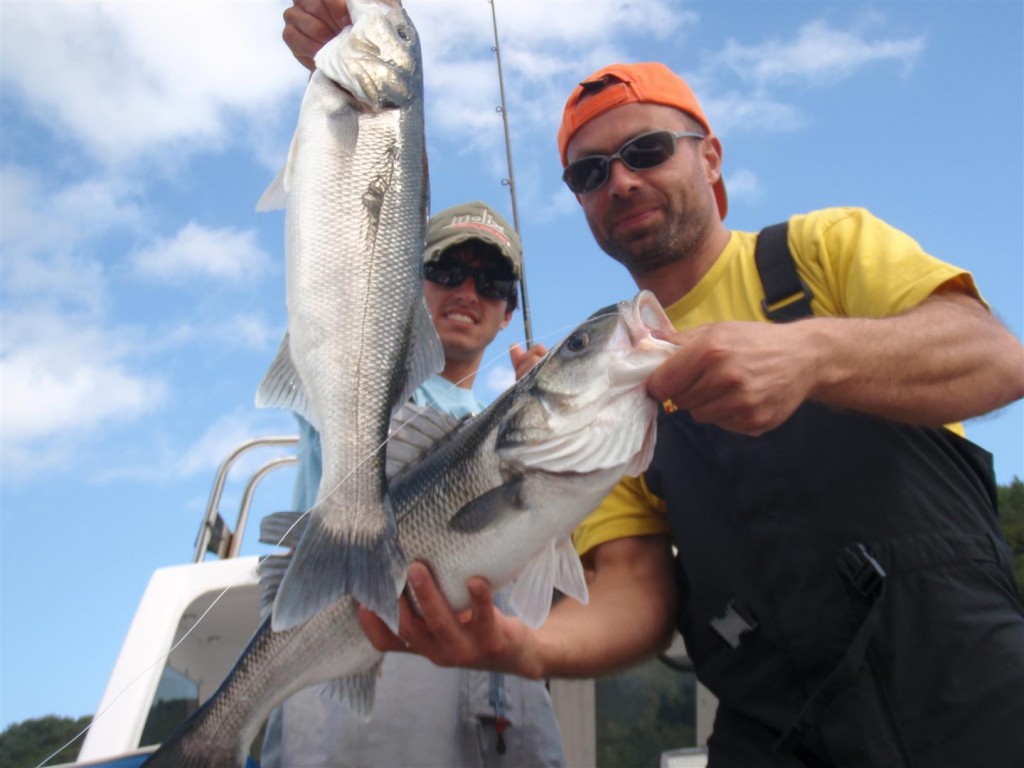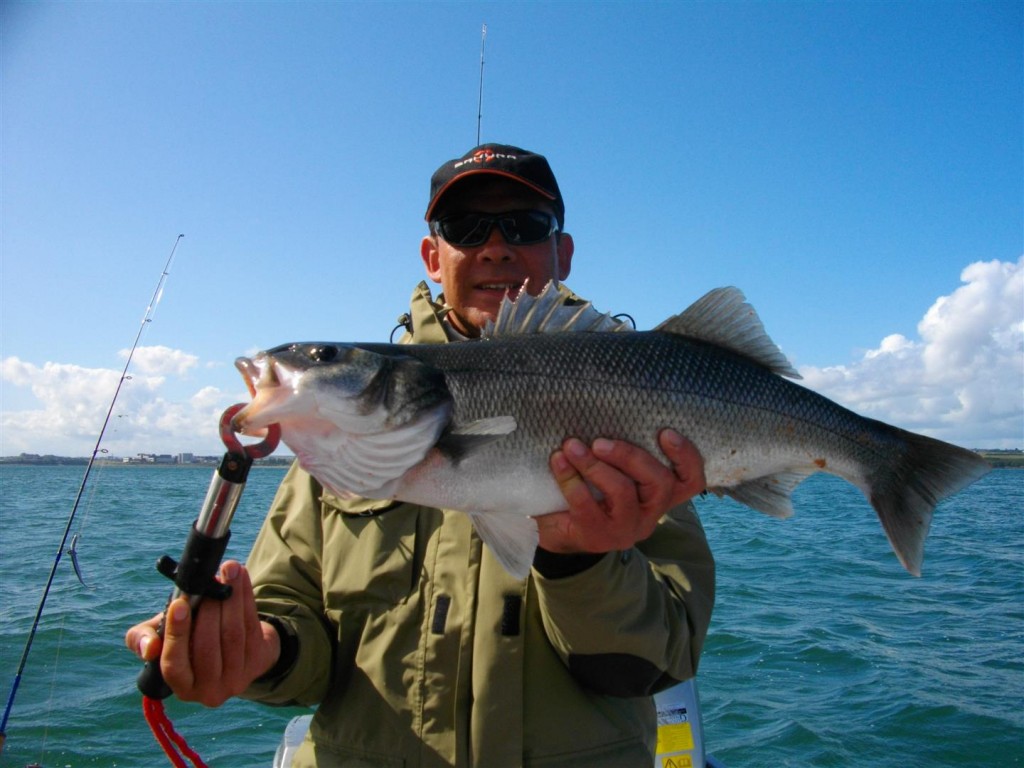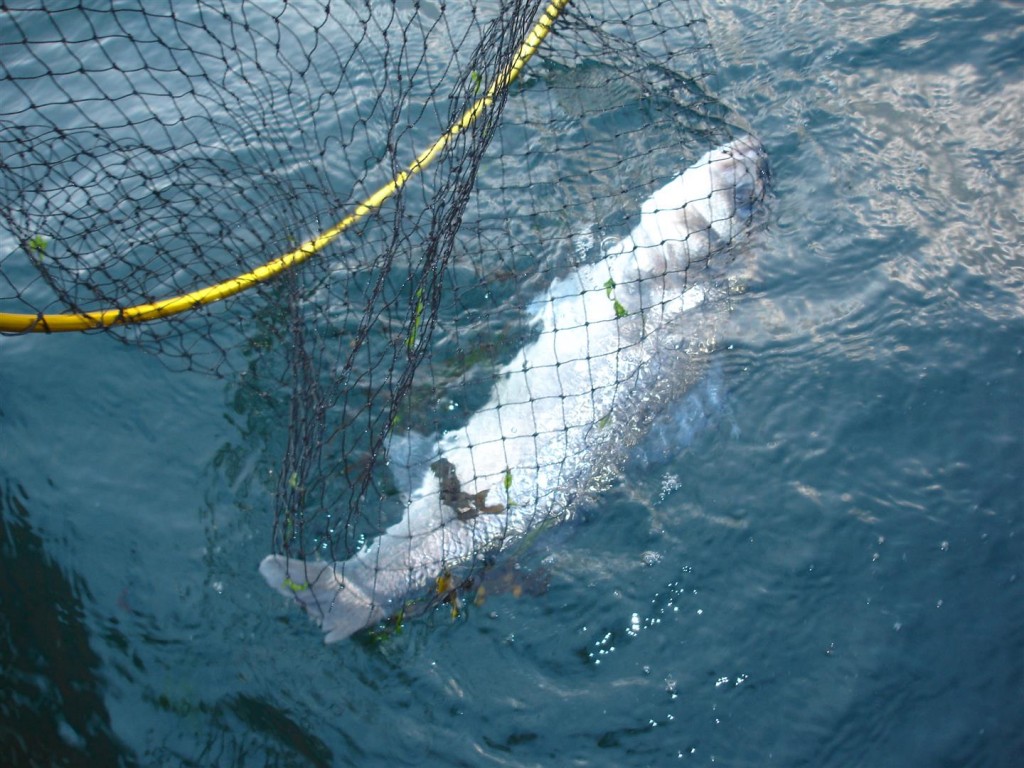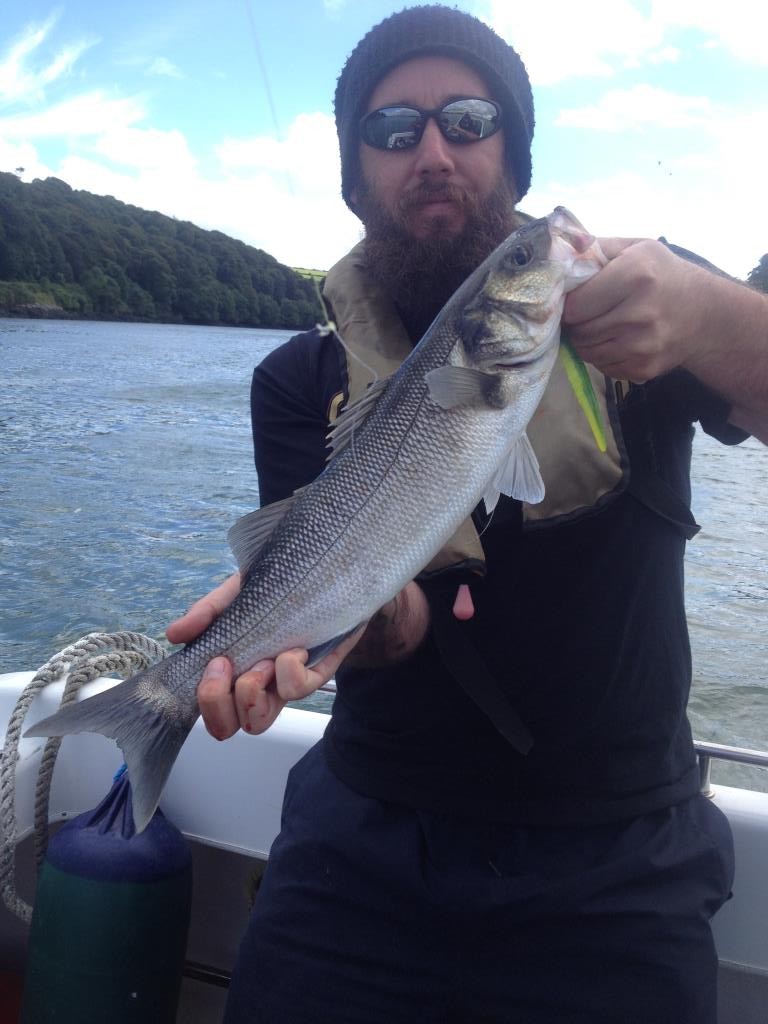* Bass or Bust!
(Click on Pictures to enlarge)
Bass or Bust!
In 2010 there was a real threat to the status of bass as a sport fish. Thankfully Simon Coveney the minister with responsibility maintained the protection on bass. In 2011 we experienced major drops in the amount of fish we were catching. In 2010 this commentary piece was published in Irish Angler:
Bass have never been the news as much as lately. Jim Clohessy tries to put the whole thing into a dinghy angler’s perspective.
I have been fishing for thirty odd years. Like most small boat anglers I started out fishing from the shore and gradually worked my way to boat angling. For me it was always a logical progression, getting closer to my quarry so to speak! I have always had lofty ambitions of catching bass. In the early nineties bass were never much on the agenda. They were more an occasional catch from the shore and were an elusive dream from the boat. I think this was more to do with lack of technique and skill in my case but in the early nineties there were experienced boat anglers fishing for bass regularly. To a man they were defeated due to lack of fish. It became a fruitless exercise that sapped the angling will from many skilled fishermen. The fish were simply not there in numbers to make bass a worthwhile quarry. The fish had been virtually wiped out by years of overfishing.
In the sixties bass could be caught like mackerel in many places around the south coast. There were noted areas where bass would shoal during the summer as they harassed plentiful shoals of baitfish. Areas such as Splaugh Rock near Rosslare, Youghal Bay and Dungarvan held huge stocks of fish. It must have appeared as an endless supply of nature’s bounty. It was not to be. As sure as night follows day the fish were relentlessly netted. Advances in net technology and better boats played their part in the inevitable downfall of the bass. By the time the eighties rolled around commercial interests did not seem to mind that there was going to be conservation measures put in place to try and save the species, bass were not a commercially viable species at that stage.
Recent history has shown that conservation measures do not always work. Take the story of Grand Banks cod. A fishery that had lasted centuries was wiped out by commercials within the space of a couple of decades. It probably would have happened sooner if the area did not get a rest during the war years. So commercial fishing that had begun with the Basques in the fourteen hundreds had ended with multinational bottom draggers in 1992. The fishery is still closed. Cod had been fished to near extinction. The conservation measures have not worked. The depleted stocks have not recovered to a level where a serious commercial fishery can resume.
The case in Ireland and our bass was that we were lucky. The measures introduced came just in time to save the some of the fish; some of the breed stock. The measures were simple: Bass could not be commercially targeted. It was deemed illegal to sell wild Irish bass. Anglers would have to abide to a two fish per angler limit in any twenty four hour period – a chance would be a fine thing to many anglers! To the most part the ban was respected. There was little alternative for many commercial boats as the stock were so reduced as to make the species unviable anyway. Bass were somewhat safe for a time.
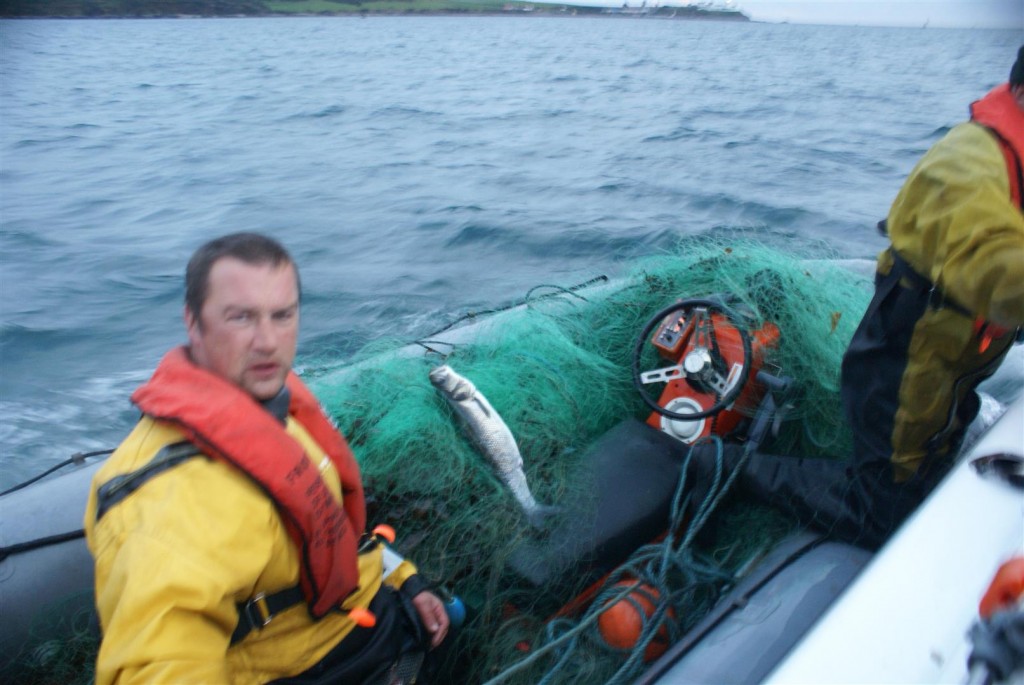
Since the Bass Conservation measures were introduced there has been a bass poaching problem. I know that in Cork many fishermen supplemented their income netting bass in estuaries and shallow harbours, the only places where some bass remained. Through vigilance and hard work the Regional Fisheries Boards played cat and mouse with poachers and had a degree of success in giving the remaining fish a break. The bass got another break in the mid to late nineties: the cub that was the Celtic Tiger was born and soon there were easier ways to make extra money rather than skulking around in the dark netting bass.
I cannot remember a conscious idea in my head that bass were making a recovery. I thought I was becoming a better angler! In hindsight I think the protection measures were having more of an effect on my angling than any particular prowess on my behalf! Bass were still not a realistic target from the boat. I had tried on many occasions but soon headed back to fish for species that were more plentiful and easier to catch. We were into the new millennium before I tried in earnest to target bass from the boat again. I was spurred on by the catches of bass by visiting UK based anglers. These guys had honed techniques over years across the water. It seemed to me that bass fishing from the boat was a largely forgotten art in my locality. The guys who could remember good catches were largely gone and the new crop of anglers, of which I was one, were not exactly well versed in the dark art of bass fishing.
The Fishing
What a fish to conspire to catch is a bass! A bar of sliver muscle, a truly impressive fish; a fish so elusive it has gained a reputation as being the smartest of fish. A true predator, boss in its patch of water, Bass are an aggressive predator and this is the chink in its armour – it just cannot resist an easy meal. Whether it is a nicely presented bait, a well worked plug or spinner, a deftly actioned softbait or a well stripped fly the poor ould bass cannot resist. It has to be said if the bass are present then they are actually an easy catch. It is the working out and finding out where the bass are at any given stage of tide that has created the myth that bass are an elusive and tough quarry. Over time I began discover some bass marks. My first efforts could be described as shore fishing from a boat. Other than the fact that that I was using a longer boat rod, the techniques I was employing were the same as I had used on the beach. Bait was more successful for me than lures. Over time patterns of fish movement and tidal conditions were becoming apparent. The spring tides were most productive, the amount and quality of fish increased around the biggest of tides. Bass could be caught on neaps but it was harder work. In latter times the moon phases could be seen to have some effect as well. In all cases simplicity of trace was the key. Simple legers or one up one down rigs were my most successful rigs. Light leads; just enough to hold in the tide were and still are the best bet. During summer breaks in Guileen it was hard to miss the explosion of anglers who were tramping the shoreline and who were at last managing to catch a few bass. I had some myself! Mostly they were caught on Kilty spinners but plugs were effective as well; the Aile Magnet was beginning to forge its reputation.
Early in the new millennium there were strange beasts inhabiting the shoreline, the fluff chuckers had arrived! They came they waded and they thrashed the waters all along the south coast. They caught fish as well and you could not help but notice the amount of strange accents! The tourists had started to arrive, lured by the promise of some good bass fishing. This was fishing that they could not get on home turf in the UK and elsewhere. By now me and other dedicated souls were seriously working the waters from our boats. We began to catch a few fish more regularly using lures. We continued to amass information most of which was guarded and kept largely to ourselves. This less to protect the fish from other anglers but more to protect the fish from the regular activities of poachers. Poaching was rampant. Eventually anglers took a proactive role in protecting stocks and reported poaching to the relevant bodies. This in Ireland, a country where there is a bitter history surrounding informers, was a turn of events that cannot be understated. At last we had something to protect, anglers were prepared to act.
The Future 2010>
Bass are still an elusive quarry. There still is not an abundance of fish but there is enough fish to justify spending time and money in chasing them. If you told an angler from the seventies that there would be people making a living from bass guiding you would be laughed at. If you told the same angler that anglers would come from the UK and Europe just for the chance at catching one of our bass you would be laughed out of the bar! Tourist anglers who had flocked to our shores in the sixties and stayed away in the bleak eighties have started to return again. All around the country there are diverse communities reaping the benefits that a reasonable bass fishery brings. Most other stalwarts, the cod, the pollack, the haddock, cod and whiting are in decline bass are the only species that are hanging there.
The future should be looking bright for bass. Two years ago (2008) the minister signed the bass conservation measures into law. No longer would the measures have to be renewed annually. No longer would commercial interests crank out their annual wish to reopen the fishery. They have taken notice of the catches that anglers are making. It does not matter that most anglers’ fish are returned to the water to fight another day. Still the protection is in place and it would seem that bass would be a species reserved for anglers. That brings us to mid 2009 – The Federation of Irish Fishermen (FIF) submitted a proposal to government about the possibility a commercial bass fishery. The proposal is simple: Irish boats should be allowed fish for bass and land them for sale where they are caught beyond the latitude of W51.30’, an imaginary line that almost touches the coast at Mizen head on the south coast. The proposal plays on a crucial point: Discrimination – foreign boats are allowed to tranship bass through Irish ports, why cannot Irish boats? The proposal cites UK studies that apparently show the stock is in a healthy state (edit: some change in 2013!).
I am sure that many of you have read the arguments from both sides on this issue. I will not delve to deep into these points other than to say that an assessment that bass stocks are healthy in our waters does not exist. The commercial bass fishery in the UK is largely an inshore one. There is limited pair trawling done offshore carried out in the English Channel. If there is such a lucrative offshore bass fishery off our coast then why are Irish boats not landing fish in the UK? My basic research tells me that they are not precluded from doing so. I was not able to get figures on the quantity of bass landed into our ports by non-Irish vessels. It is my opinion that the proposal is little more than a fig leaf and that if agreed to by Government has the inevitability of seeing our bass stocks decimated within a short time. Let’s face it there is no way to tell where a bass has been caught. It would be inevitable that bass would be transhipped to boats that have been fishing outside the magic line. The work of twenty years will be for nought and after the arse falls out of the bass price due to over fishing we will have little left to lure anglers to the country. We already have lost huge chunks of the market to Iceland, Norway and Sweden and the loss of bass as an angling target would serve to put a nail in the coffin for the remaining service providers.
Bass Revolution
It worries me that a revolution in bass fishing is only just starting in this country and that the opportunity could be stolen from us. That revolution is the softbait-bass fishing that is sweeping Europe. It is fair to say that we are a little behind the Japanese the Americans and especially the French in terms of our lure fishing for bass. Anglers in these countries have been fishing soft plastic lures for bass for some time now. The techniques perfected in other countries are only just starting to take on here in Ireland. The last couple of years have seen an explosion into the market of some fantastic lures from Xlayers to Illex Nitros to Motherworms and other highly developed plugs and soft lures. These lures bring another new way of fishing for the boat angler. I have said before that I only got to grips with some of these lures in the last couple of years. So I am looking forward to this year (2010) in order to get a real crack off them. Over the winter months I have been adding to my collection. Many guys have been playing with these lures for a while now and the reports are exciting to say the least. It will be a summer of Texas rigs and Texexposed hooks and leadheads! I watched some French anglers have a cracking session in Cork Harbour last year. They were fishing from one of the Bella Vista self drive Warriors and they were having some magic action in quieter arts of Cork harbour. Kevin Murphy of the Bella Vista hotel tells me he had parties of bass mad Dutch last year and they were delighted with the standard of the bass fishing available. It is scary to think that these visiting anglers are but the tip of the iceberg in terms of a potential European market of bass hungry anglers all wanting to spend their hard earned euro in this country. Bass fishing in France is huge. They have magazines dedicated to bass fishing alone such is the size of the market. To a man the French are worried about their stocks of bass. That is from a country where the habitat is perfect for bass unlike our fish that are very dependent on the weather to ensure that eggs will hatch and the cycle goes on.
Like other anglers I have written to the ministers and I have plagued my local TD’s. We must all keep up the pressure and ensure that there is no decision made based on the interests of the few rather than the many. Not only do the fish demand protection but the livelihoods of the diverse stakeholders that are involved do to. We all have a right to the shared resource that is bass; the commercial industry has enough species to fish for. Bass will not make the difference to the commercial sector. Bass may just make the difference to you and me as anglers. Hell, I might even chuck some fluff!
Edit 2015:
- The spectre of opening up the bass fishery to commercials has not gone away it only rests a while before rearing its head again. Hopefully EU measures will keep things quiet a while.
- The recent EU legislation banning pelagic mid-water trawling for the 2015 season is welcome. It is important that they do the same next year. These measures have not been successful in reducing the catch of bass. Inshore fishermen worked harder, drift netting was employed in the English Channel – The EU will have to think again.
- In 2011 we experienced an unexplained drop in our bass numbers. It was staggering really. My catch fell by at least 60%. Other suffered at least the same. Some did not but on investigation their fishing patterns changed – night lure fishing became popular. As of 2014 bass numbers have not recovered to 2010 levels.





